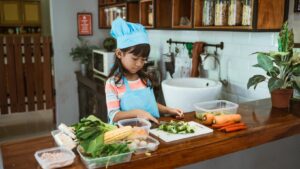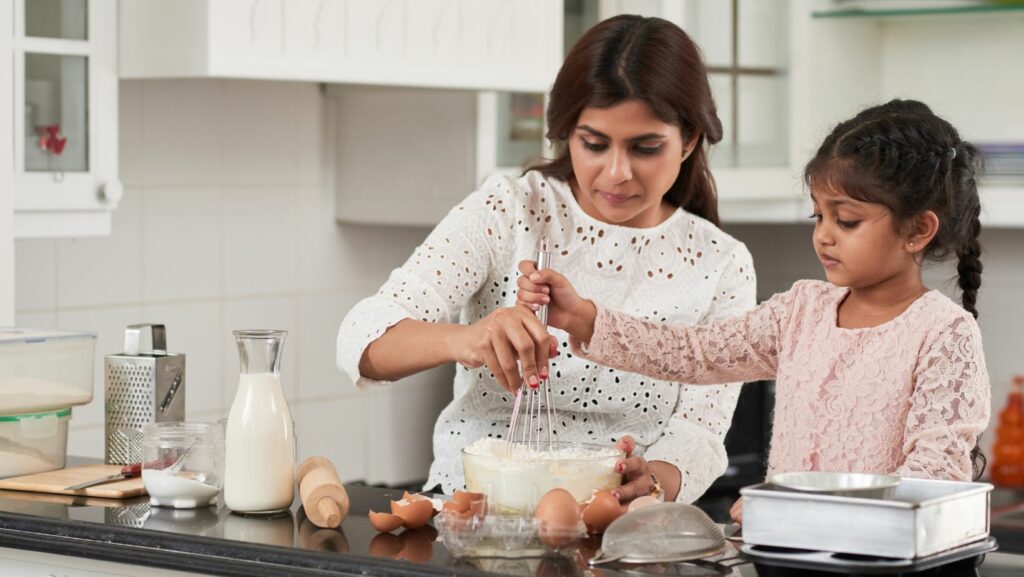Imagine the joy of kneading dough, the thrill of watching cookies rise in the oven, or the delight in a child’s eyes when they taste a dish they’ve helped create. Welcome to the world of cooking classes with kids – a realm where culinary arts meet fun-filled education.
Cooking isn’t just about preparing meals; it’s a transformative journey that instills essential life skills in young minds. Through a hands-on cooking class, kids learn about nutrition, math, and even science. But that’s not all; they also develop their creativity, patience, and teamwork abilities.
Cooking Class With Kid

Moving on from the importance of cooking classes for kids, it’s essential to delve deeper into the specifics to fully capitalize on the benefits. These aspects include the age appropriateness of the class, binding safety measures, and ensuring engaging content.
Firstly, Thoughtfulness about age appropriateness plays a crucial role in a child’s cooking class experience. Generally, cooking classes provide tiered lessons correspondingly with a child’s age group. For instance, a class for 3-5 year olds might emphasize basic kitchen safety and food preparation, such as washing fruits and vegetables. For kids aged 6-8, the classes could introduce simple baking recipes like chocolate chip cookies or mini pizza. As children reach 9-12 years, they can handle more complex recipes and techniques, for example, making pasta from scratch. It’s not just the child’s age, but also their developmental readiness that influences the level of culinary tasks they can undertake.
Focus on Safety Measures
Secondly, prioritizing safety measures ensures a secure learning environment for children in the kitchen. Components like constant adult supervision, accessible first-aid kits, and child-friendly kitchen tools form the cornerstone of safety in a kids’ cooking class. Moreover, educating about potential hazards like hot surfaces, sharp objects, or even potential allergens, equips children to handle emergencies. For instance, a class could start by teaching kids to identify and use a child-safe knife, reducing the risk of cuts.
Look for Engaging Content
Lastly, engrossing content ensures children retain interest and learn effectively during the cooking class. This could include interactive activities such as ingredient shopping tours, nutrition games, recipe inventing contests, or even a mini ‘MasterChef’. For instance, a ‘Rainbow Salad’ day could teach children about vibrant fruits and vegetables, their nutritional values, and how to prepare an easy salad. In a nutshell, they present learning in a playful manner, ensuring kids remain hooked and absorb essential kitchen knowledge.
Benefits of Cooking Classes for Kids

Cooking classes for youngsters bring forth a multitude of benefits, shaping their growth in diverse ways. Laced with creativity, nutritional education, and motor skills development, these classes serve as a well-rounded activity with far-reaching impacts.
When kids engage in cooking classes, an environment promoting creativity, expression, and innovation ensues. Provided with different ingredients, such as varied vegetables, fruits, and spices, children are empowered to concoct unique recipes. They learn the art of adding a personal spin to traditional dishes – an ability that stokes their creative thinking and problem-solving skills.
Teaching Nutritional Values
Cooking classes offer kids more than just culinary skills. They serve as practical platforms for integrating nutrition education, making youngsters more mindful of the food they eat. During these classes, children understand the significance of nutritious ingredients like whole grains, fruits, and vegetables, in a meal. Knowledge about various food groups, nutrients, and their role in overall health seeps in naturally when kids prepare meals themselves, ultimately promoting healthy eating habits.
Enhancing Fine Motor Skills
In the kitchen, children have ample opportunities to refine their fine motor skills. Tasks like measuring ingredients, chopping veggies, wielding a whisk or stirring a batter are all part of these classes. It’s in performing these actions repeatedly, children learn control and coordination, bolstering their motor skills significantly. For example, gripping a spoon to stir improves their hand-eye coordination while kneading dough aids in enhancing their dexterity. Cooking isn’t just about preparing meals; it’s a transformative journey that instills essential life skills in young minds. Through a hands-on cooking class, kids learn about nutrition, math, and even science. But that’s not all; they also develop their creativity, patience, and teamwork abilities.

